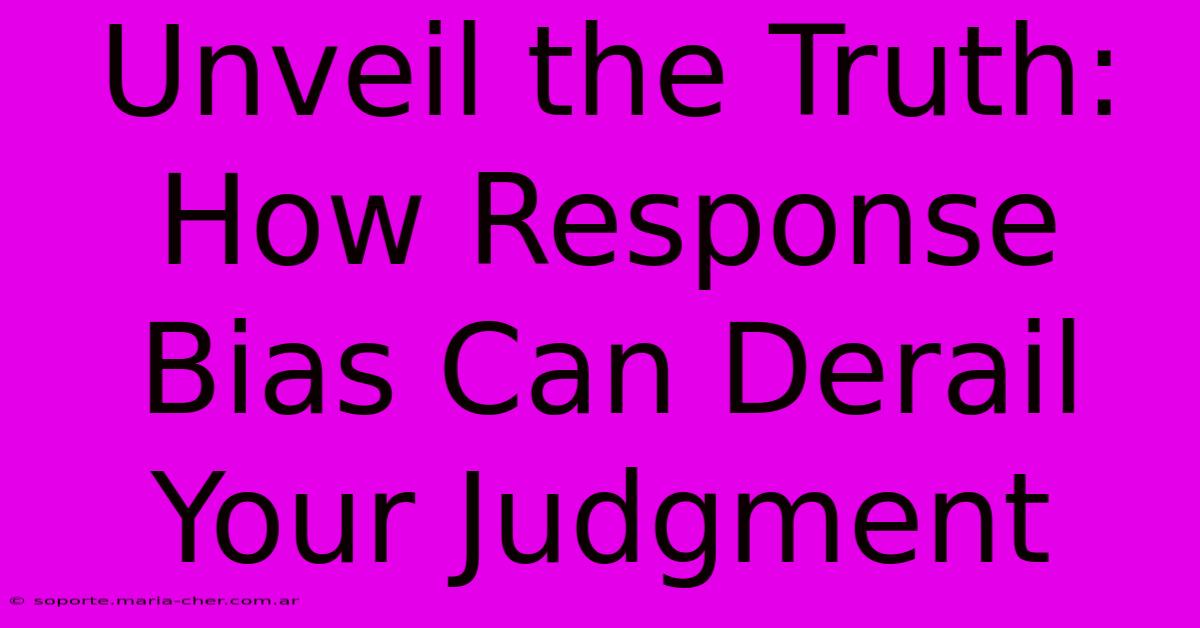Unveil The Truth: How Response Bias Can Derail Your Judgment

Table of Contents
Unveil the Truth: How Response Bias Can Derail Your Judgment
We pride ourselves on rational decision-making. We weigh the pros and cons, analyze data, and strive for objectivity. But what if our own minds are subtly sabotaging our judgment? The truth is, our inherent biases can significantly skew our perceptions and lead to flawed conclusions. This article delves into the fascinating world of response bias, unveiling how these cognitive shortcuts can derail your judgment and offering strategies to mitigate their impact.
What is Response Bias?
Response bias, in its simplest form, is the systematic tendency to respond inaccurately or misleadingly. It's a pervasive phenomenon that affects how we answer questions, make choices, and interpret information. Unlike conscious manipulation, response biases are often unconscious, operating beneath the surface of our awareness. They stem from various psychological factors, impacting the reliability and validity of data collection in research and impacting our everyday decisions. Understanding these biases is crucial for making sound judgments in all areas of life, from personal choices to professional endeavors.
Common Types of Response Bias:
Several types of response bias can significantly influence our judgments. Here are some key examples:
-
Acquiescence Bias (Yea-Saying): The tendency to agree with statements regardless of their content. This is particularly prevalent in surveys and questionnaires where participants might simply agree to avoid conflict or appear agreeable.
-
Social Desirability Bias: The tendency to answer questions in a way that portrays oneself in a positive light. People might downplay negative behaviors or exaggerate positive ones to create a favorable impression.
-
Confirmation Bias: The tendency to favor information that confirms pre-existing beliefs while ignoring or downplaying contradictory evidence. This bias reinforces our existing viewpoints and makes it difficult to consider alternative perspectives.
-
Anchoring Bias: The tendency to over-rely on the first piece of information received (the "anchor") when making decisions, even if that information is irrelevant or unreliable.
-
Recency Bias: The tendency to overemphasize the most recent information when making judgments, overshadowing past experiences or data.
How Response Bias Impacts Your Judgment:
The consequences of unchecked response bias can be substantial. In personal life, it can lead to flawed relationships, poor financial decisions, and missed opportunities. Professionally, it can hinder effective teamwork, impair strategic planning, and impede innovation.
Examples of Real-World Impacts:
-
Misleading Survey Results: Response bias can render survey data unreliable, leading to inaccurate conclusions and flawed policy decisions.
-
Poor Hiring Decisions: Interviewers susceptible to bias might overlook qualified candidates or unfairly favor those who align with their preconceptions.
-
Ineffective Marketing Campaigns: Marketing strategies based on biased data can fail to resonate with the target audience.
-
Faulty Legal Judgments: Jurors might be influenced by response biases, leading to unjust verdicts.
Strategies to Mitigate Response Bias:
While completely eliminating response bias is impossible, we can take steps to minimize its impact on our judgment:
-
Become Aware: The first step is recognizing the existence and influence of these biases. Understanding how they operate is crucial for developing strategies to counter them.
-
Seek Diverse Perspectives: Actively solicit feedback from individuals with differing viewpoints. This can help challenge our assumptions and identify potential biases.
-
Use Structured Decision-Making Processes: Implement frameworks that encourage objective analysis and minimize reliance on intuition or gut feelings.
-
Employ Randomized Techniques: In research or data collection, randomizing the order of questions or stimuli can help reduce the impact of certain biases.
-
Use Blind or Double-Blind Procedures: When appropriate, blinding participants or researchers to certain aspects of a study can minimize bias.
-
Critical Evaluation of Information: Always critically evaluate information sources and be wary of confirmation bias. Consider alternative explanations and counterarguments.
Conclusion:
Response bias is a pervasive force that subtly shapes our judgments and decisions. By understanding its various forms and employing strategies to mitigate its influence, we can make more informed, rational choices and improve the accuracy of our perceptions. The path to better judgment lies in embracing self-awareness and cultivating a more critical and objective approach to information processing. Becoming aware of these biases is the first step towards reclaiming control of your decision-making process and making choices that truly reflect your best interests.

Thank you for visiting our website wich cover about Unveil The Truth: How Response Bias Can Derail Your Judgment. We hope the information provided has been useful to you. Feel free to contact us if you have any questions or need further assistance. See you next time and dont miss to bookmark.
Featured Posts
-
The Wireframe Wizard Unleash The Magic Of Data Enhanced Designs
Feb 07, 2025
-
Break The Chains Overcome Response Bias For Clearer Decisions
Feb 07, 2025
-
Scratching Your Head About Urgent Care Costs Heres The Answer
Feb 07, 2025
-
Gas It Up The Ultimate Guide To Understanding Gases For Every Curious Mind
Feb 07, 2025
-
Print With Precision Our Ultimate Guide To Rolls 90640 Label Printing
Feb 07, 2025
